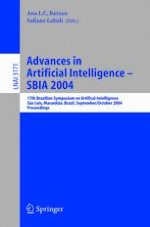2004 | OriginalPaper | Buchkapitel
Learning with Drift Detection
verfasst von : João Gama, Pedro Medas, Gladys Castillo, Pedro Rodrigues
Erschienen in: Advances in Artificial Intelligence – SBIA 2004
Verlag: Springer Berlin Heidelberg
Enthalten in: Professional Book Archive
Aktivieren Sie unsere intelligente Suche, um passende Fachinhalte oder Patente zu finden.
Wählen Sie Textabschnitte aus um mit Künstlicher Intelligenz passenden Patente zu finden. powered by
Markieren Sie Textabschnitte, um KI-gestützt weitere passende Inhalte zu finden. powered by
Most of the work in machine learning assume that examples are generated at random according to some stationary probability distribution. In this work we study the problem of learning when the distribution that generate the examples changes over time. We present a method for detection of changes in the probability distribution of examples. The idea behind the drift detection method is to control the online error-rate of the algorithm. The training examples are presented in sequence. When a new training example is available, it is classified using the actual model. Statistical theory guarantees that while the distribution is stationary, the error will decrease. When the distribution changes, the error will increase. The method controls the trace of the online error of the algorithm. For the actual context we define a warning level, and a drift level. A new context is declared, if in a sequence of examples, the error increases reaching the warning level at example k w , and the drift level at example k d . This is an indication of a change in the distribution of the examples. The algorithm learns a new model using only the examples since k w . The method was tested with a set of eight artificial datasets and a real world dataset. We used three learning algorithms: a perceptron, a neural network and a decision tree. The experimental results show a good performance detecting drift and with learning the new concept. We also observe that the method is independent of the learning algorithm.
